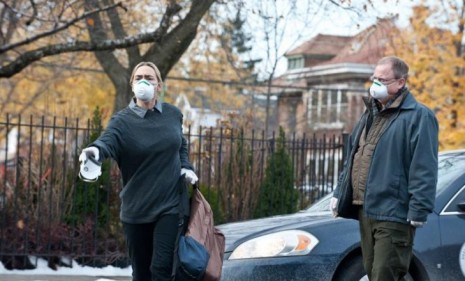Could Contagion really happen?
Steven Soderbergh's thriller depicts a deadly pandemic that threatens the globe — a harrowing story line that's more realistic than moviegoers might think

A free daily email with the biggest news stories of the day – and the best features from TheWeek.com
You are now subscribed
Your newsletter sign-up was successful
The marketing campaign for Steven Soderbergh's new film, Contagion, which opens Friday, promises a frightening thriller about a deadly pandemic spreading quickly through the world. A particularly unsettling image of star Gwyneth Paltrow succumbing to the mysterious disease may be spooking prospective moviegoers. But the scariest thing about Contagion might be the recent confirmation from experts that a pandemic like the one in the film could actually happen. Here, a guide:
What kind of disease in portrayed in the film?
Contagion follows the spread of a lethal virus modeled after the Nipah virus, which plagued Malaysian farmers in the late '90s. In the movie, the disease begins in a bat and spreads to pigs on a farm. It then mutates and infects a chef in Macau, who passes it on to people from America, Japan, and China. Through them, the virus infects thousands more. "We were looking for something that was unsettling because of the banality of the transmission," says Soderbergh, as quoted by The New York Times. The film explores the many vectors through which a pandemic can spread in today's globalized world, and the challenges of containing it.
The Week
Escape your echo chamber. Get the facts behind the news, plus analysis from multiple perspectives.

Sign up for The Week's Free Newsletters
From our morning news briefing to a weekly Good News Newsletter, get the best of The Week delivered directly to your inbox.
From our morning news briefing to a weekly Good News Newsletter, get the best of The Week delivered directly to your inbox.
How did the film make sure the disease was credible?
Soderbergh hired a team of consultants and experts led by Dr. Ian Lipkin, an epidemiology and pathology professor at Columbia University. Lipkin advised Paltrow on how to believably act out her seizure scene; tutored actresses Kate Winslet and Jennifer Ehle, who play epidemiologists in the film, on how to properly use testing equipment; and suggested changes to parts of the dialogue that would have weakened the film's credibility. Several scenes were even filmed at the Atlanta Centers for Disease Control.
And it's realistic?
"How the virus unfolds in the movie is true to life in terms of how a virus behaves," says CDC senior adviser Barbara Reynolds. In order for a disease to become a pandemic, a virus or microbe must cause severe disease, the larger population must be susceptible to it, and there must be person-to-person transmission. The film is scientifically accurate in that regard, says Walsh, but is also remarkable for "the depiction of swift, brutal societal breakdown after a killer suddenly appears in our midst."
A free daily email with the biggest news stories of the day – and the best features from TheWeek.com
Could something like Contagion really happen today?
Possibly. As a result of deforestation and increased human contact with disease-carrying animals like rats and other rodents, society is becoming more susceptible than ever to a deadly, fast-spreading virus like the one in Contagion. "Over 75 percent of emerging infectious diseases represent infectious agents that jump from animals to humans," says Lipkin, as quoted by Mother Nature Network. HIV and SARS are two recent examples of this happening — and it could happen again on an even more harrowing scale.
Can anything be done about it?
Two recent pandemics, SARS in 2003 and the H1N1 virus in 2009, were mercifully contained despite fast spreading throughout the globe — largely due to the rise of international travel. But there are lessons to be learned, says Lipkin. The government must develop better diagnostic methods, databases of patient records, support and organization for epidemiologists and public health workers, and more-efficient screening methods. "We know that sooner or later the scenario in Contagion will happen," says biostatistician Ira Longini. "But we are not helpless to deal with it."
Sources: ABC News, Mother Nature Network, NY Times, TIME
-
 How to Get to Heaven from Belfast: a ‘highly entertaining ride’
How to Get to Heaven from Belfast: a ‘highly entertaining ride’The Week Recommends Mystery-comedy from the creator of Derry Girls should be ‘your new binge-watch’
-
 The 8 best TV shows of the 1960s
The 8 best TV shows of the 1960sThe standout shows of this decade take viewers from outer space to the Wild West
-
 Microdramas are booming
Microdramas are boomingUnder the radar Scroll to watch a whole movie